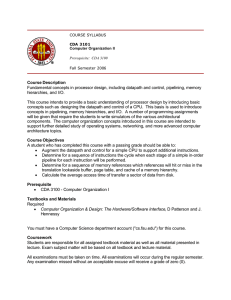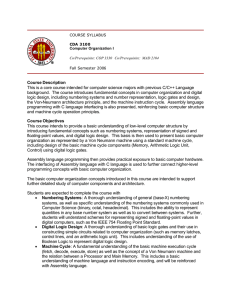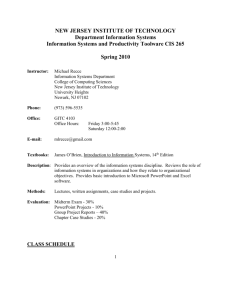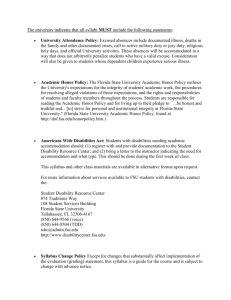Document 12288866
advertisement
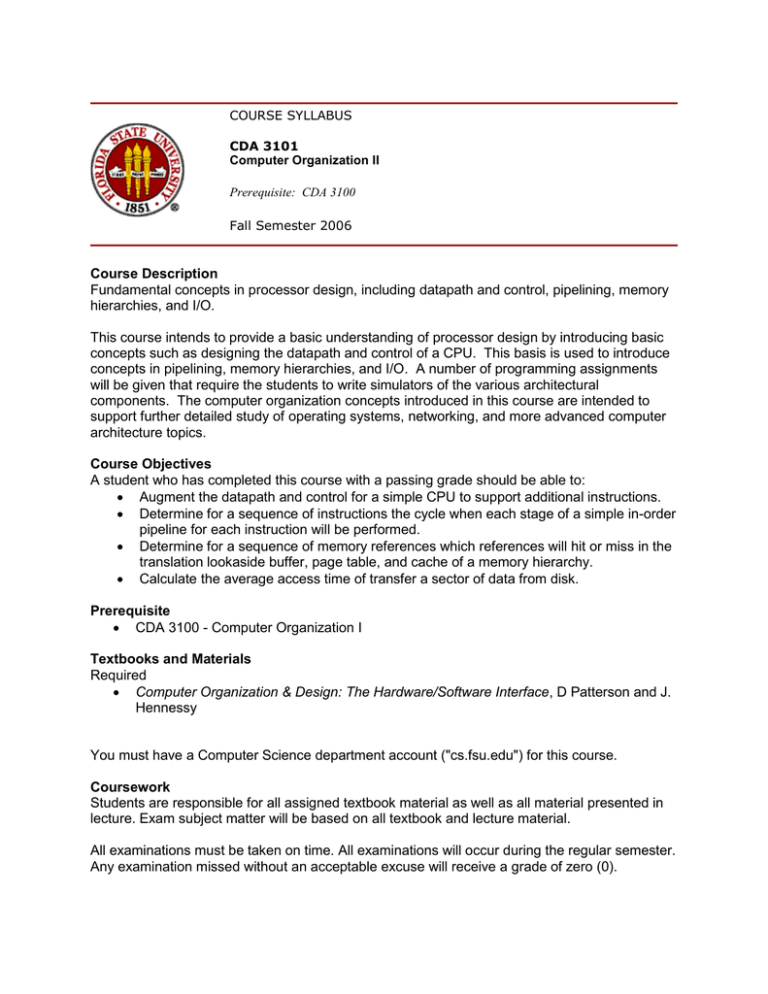
COURSE SYLLABUS CDA 3101 Computer Organization II Prerequisite: CDA 3100 Fall Semester 2006 Course Description Fundamental concepts in processor design, including datapath and control, pipelining, memory hierarchies, and I/O. This course intends to provide a basic understanding of processor design by introducing basic concepts such as designing the datapath and control of a CPU. This basis is used to introduce concepts in pipelining, memory hierarchies, and I/O. A number of programming assignments will be given that require the students to write simulators of the various architectural components. The computer organization concepts introduced in this course are intended to support further detailed study of operating systems, networking, and more advanced computer architecture topics. Course Objectives A student who has completed this course with a passing grade should be able to: Augment the datapath and control for a simple CPU to support additional instructions. Determine for a sequence of instructions the cycle when each stage of a simple in-order pipeline for each instruction will be performed. Determine for a sequence of memory references which references will hit or miss in the translation lookaside buffer, page table, and cache of a memory hierarchy. Calculate the average access time of transfer a sector of data from disk. Prerequisite CDA 3100 - Computer Organization I Textbooks and Materials Required Computer Organization & Design: The Hardware/Software Interface, D Patterson and J. Hennessy You must have a Computer Science department account ("cs.fsu.edu") for this course. Coursework Students are responsible for all assigned textbook material as well as all material presented in lecture. Exam subject matter will be based on all textbook and lecture material. All examinations must be taken on time. All examinations will occur during the regular semester. Any examination missed without an acceptable excuse will receive a grade of zero (0). All assignments must be submitted on time. All assignments will occur during the regular semester. Any assignment missed without an acceptable excuse will receive a grade of zero (0). Topics Topic ALU Implementation, Carry Lookahead Adder Datapath Components and Execution of Instructions Control Lines, Jumps Multicycle Datapath and Control Exception Handling Pipelines and Hazards Pipelined Datapath and Control Data Hazards and Forwarding Stalls, Branch Hazards Branch Prediction, Cache Cache Structure and Associativity Read and Write Misses, Cache Performance, Multilevel Cache Virtual Memory, Address Translation Page Table, Page Faults Translation Look-Aside Buffer, TLB Misses, Performance Measurement Grading The following table lists individual point values for examinations and assignments: Scoring (out of 100) Exam 1 Exam 2 Project 1 Project 2 Project 3 Project 4 Total 30 points 30 points 10 points 10 points 10 points 10 points 100 points Final scores will be calculated by comparing the total points accumulated by a student to a total of 100 points. Final grades will be assigned based on the table below. No curve is applied. 90% A 80% B 70% C 60% D < 60% F Academic Dishonesty Students are subject to the Academic Honor Code published in The Florida State University Bulletin and the Student Handbook. The Academic Honor System of The Florida State University is based on the premise that each student has the responsibility (1) to uphold the highest standards of academic integrity in the student's own work, (2) to refuse to tolerate violations of academic integrity in the university community, and (3) to foster a high sense of integrity and social responsibility on the part of the university community. Please refer to the following web sites for a complete explanation of the Academic Honor Code. http://www.fsu.edu/Books/Student-Handbook/codes/honor.html http://www.fsu.edu/Books/Student-Handbook/ In particular, note that students may not give or receive help of any kind on programming projects. This means, among other things, that students are not permitted to read other student's code (on paper OR on screen) or discuss design or implementation of programming projects with anyone other than with the course staff. When studying for this course collaboration among students is encouraged. However, all submitted assignments and examinations are expected to be the work product of the individual student alone, performed without unauthorized assistance. There is a line between helping fellow students learn and performing work for someone else and we all know where that line falls. If a student is at all uncertain about any act of collaboration discuss it with course staff before the act. DO NOT work together on submitted assignments. The work you submit must be yours, and yours alone. Violations of this policy will result in expulsion from the course and a failing grade for all parties involved, as well as referral to further academic dishonesty proceedings as necessary. Americans with Disabilities Act Students with disabilities needing academic accommodation should: (1) register with and provide documentation to the Student Disability Resource Center; (2) bring a letter to the instructor indicating the need for accommodation and what type. This should be done during the first week of class. For more information about services available to FSU students with disabilities, contact the Student Disability Resource Center 97 Woodward Avenue, South Florida State University Tallahassee, FL 32306-4167 (850) 644-9566 (voice) (850) 644-8504 (TDD) sdrc@admin.fsu.edu http://www.fsu.edu/~staffair/dean/StudentDisability/ (This syllabus and other class materials are available in alternative format upon request.) Syllabus Change Policy This syllabus is a guide for the course and is subject to change with advance notice. Such notice will be in the form of an announcement by e-mail to all students through their Garnet accounts, and by voice in course lecture.
